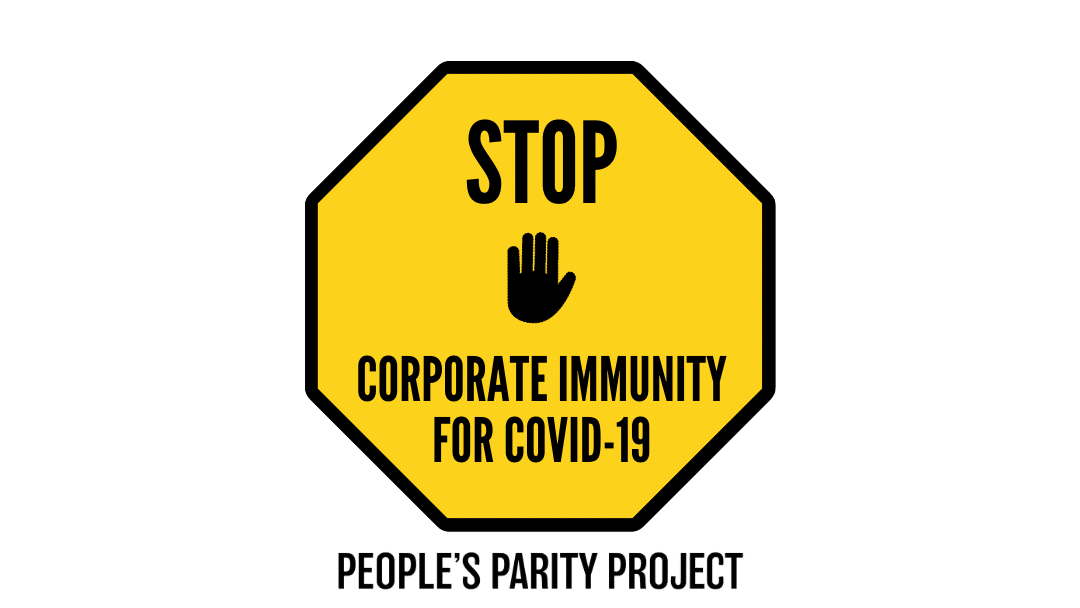Law Students Nationwide Push Universities to Oppose Corporate Immunity

Law students across the country launch coordinated campaign against Republican efforts to enact sweeping corporate immunity in response to the COVID-19 pandemic.
Today, the People’s Parity Project (PPP) announced a nationwide mobilization of law students fighting efforts to grant companies, including colleges and universities, blanket immunity for coronavirus-related lawsuits. Organizers from nearly a dozen law schools have joined the campaign to oppose corporate immunity, which would shield businesses and corporations from liability if they endanger workers, students, and the public by not establishing adequate protections during the COVID-19 pandemic.
Law student organizers demanded that colleges and universities stop lobbying Congress for corporate immunity. Industry trade associations, such as the American Council on Education and the Association of American Universities, are demanding Congress grant employers, including colleges and universities, immunity from COVID-19-related lawsuits. The launch of the campaign follows PPP’s submitted testimony to the Senate HELP Committee opposing corporate immunity, and marks a significant escalation in progressive efforts to stop the proposal.
As organizers at the University of Michigan Law School wrote in a petition to the University, “The legislation would disincentivize colleges from taking reasonable precautions against the spread of COVID-19.” Corporate immunity would make it impossible to hold universities and other corporations accountable if they refuse to take reasonable steps to re-open — potentially increasing the spread of the virus, forcing schools to shut down again, and endangering thousands of workers, students, and other community members.
In addition, student organizers have emphasized the ways corporate immunity would exacerbate racial inequities. “Corporate immunity would allow corporations and universities to value profits over the lives of employees and students — not to mention the families that most of us go home to every night. Reasonable protection against the virus should be provided, especially to Black and brown employees and students who are already at a greater risk of infection. We need to look out for each other, and we can start by holding corporations and universities accountable for taking reasonable steps to keep people safe,” said Kellye Fernandez, a PPP organizer at St. Mary’s School of Law in San Antonio, Texas.
Added Lindsey Roseman Valente, student at Suffolk University Law School, “Suffolk University cannot promise to address and advocate for systemic racial inequalities while simultaneously taking actions that create unnecessary, disproportionate risks for Black and brown students, faculty, and campus workers. As future lawyers, we willingly accept ethical responsibilities to our community, and we will fail to uphold this responsibility if we give our schools blanket legal immunity from negligent reopening practices that put profits over people.”
The coalition is demanding that schools immediately stop supporting lobbying efforts that would grant companies, including colleges and universities, immunity from liability, and are also making clear to the academic institutions that these lobbying efforts are not being done in the student’s names.. As student organizers at New York University School of Law wrote, “We want to return to campus when it is safe and healthy to do so, and with the proper precautions in place. Preventing corporate immunity will ensure that schools and corporations also share that interest.”
Active Student Petitions
- Boston University School of Law
- New York University School of Law
- St. Mary’s School of Law
- Sturm College of Law – University of Denver
- Suffolk University Law School
- University of Alabama School of Law
- University of Michigan Law School
- University of Minnesota Law School
- Washington University School of Law
Other Resources
- Roll Call: “As workers face virus risks, employers seek liability limits.”
- The Intercept: “Corporate Immunity, Mitch McConnell’s Priority for Coronavirus Relief, is a Longtime Focus of the Conservative Right.”
- The American Prospect: “The Absolute Absurdity of Blanket Corporate Immunity.”
Follow PPP
Don’t Bend the Knee: A Toolkit for Big Law Organizing
Pro-Bonus Pledge
PPP’s Pro-Bonus Pledge is organizing law firm associates (and others!) to donate our BigLaw bonuses…

